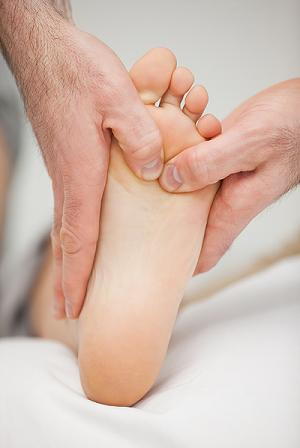Your Salem, OR, foot doctor, Dr. James Lisle or Dr. Lee Poston, fields many questions about his patients' feet and their care. Would you  like to know more about medical conditions of the foot, routine foot care, and those all-important shoes? Then read the answers to FAQs about podiatry and the doctors who specialize in it.
like to know more about medical conditions of the foot, routine foot care, and those all-important shoes? Then read the answers to FAQs about podiatry and the doctors who specialize in it.
Just what is a podiatrist?
Podiatrists are physicians who are specially trained in the diagnosis and treatment of disorders of the foot, leg and ankle. Beyond 4 years of undergraduate work and 4 years of podiatric medical school, foot doctors must complete a rigorous 2-year residency.
What do podiatrists treat?
In his or her practice, the foot doctor in Salem helps people of all ages walk better and experience fewer discomforts associated with:
- Hammertoes
- Bunions
- Plantar fasciitis
- Warts and Corns
- Flat feet
- Sprains
- Heel spurs
- Ingrown and fungal toenails
Additionally, foot doctors are the first line of defense against conditions of the feet associated with diabetes. Athletes--both professional and amateur--visit podiatrists for treatment of long-term (overuse) and acute (sprains, shin splits, tendon tears) foot issues, say experts at the College of Podiatry in London.
Do podiatrists perform surgery?
Yes, they do. Dr. Lisle and Dr. Poston are qualified to perform foot and ankle surgeries--both in the office and in the hospital. Common foot surgeries include bunionectomy and correction of hammertoes, Morton's Neuroma and metatarsal arthritis.
What are orthotics?
Orthotics are custom-made shoe inserts prescribed, designed and fabricated by your foot doctor at Cascade Foot Center. Also called arch supports or shoe inserts, orthotics fit inside shoes to correct a variety of foot problems without surgery. Orthotics balance how an individual places his foot on the ground when walking or running, ensuring less tension on bones, muscles and connective tissue.
How common is athlete's foot?
It's very common. The microorganism which causes the condition's characteristic itching and burning is called Tinea pedis, and it's spread in moist places such as inside a sweaty sneaker, poolside or in the locker room. Dr. Lisle and Dr. Poston see athlete's foot frequently and may prescribe antifungal medications to eliminate it.
How common are bunions?
These bony bumps at the base of the big toe are a common part of aging, but they can occur at any age due to arthritis, tight shoes or overuse. Surgery is a last, but resorting to shoe padding, rest, cortisone shots and orthotics are often helpful.
Why should a diabetic see the foot doctor in Salem?
Diabetics are prone to circulatory and nerve problems in their feet and hands. A small problem such as a bruise, abrasion or cut can turn into an ulcer quickly for the person who has diabetes. As such, he or she should see the podiatrist at least once a year for a comprehensive foot examination.
Learn more
Your feet carry your everywhere. Take the best possible care of them by getting a podiatric exam at Cascade Foot Center. Call the office today for an appointment: (503) 588-8188.
